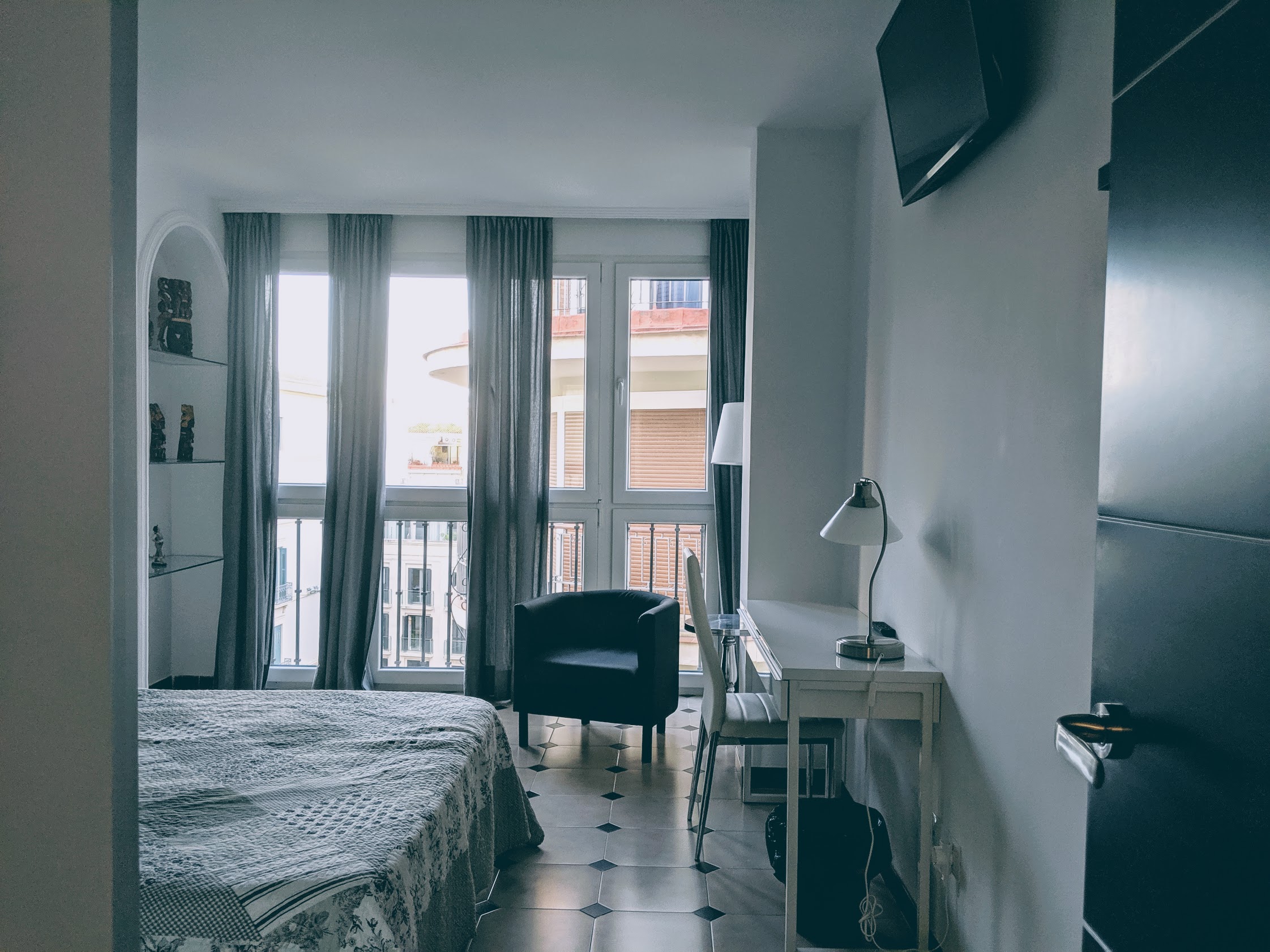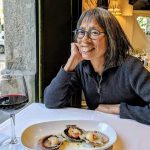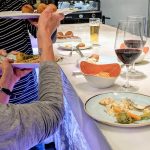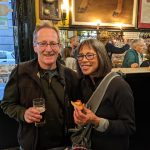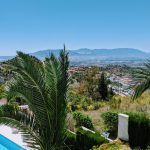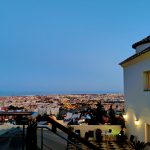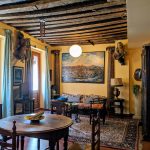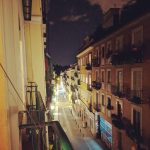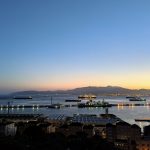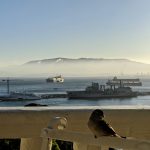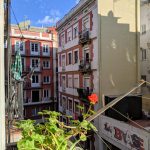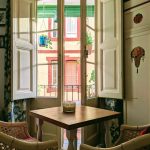Dreamy, pretend residences – Imagining my Spain vacation stays as places to write
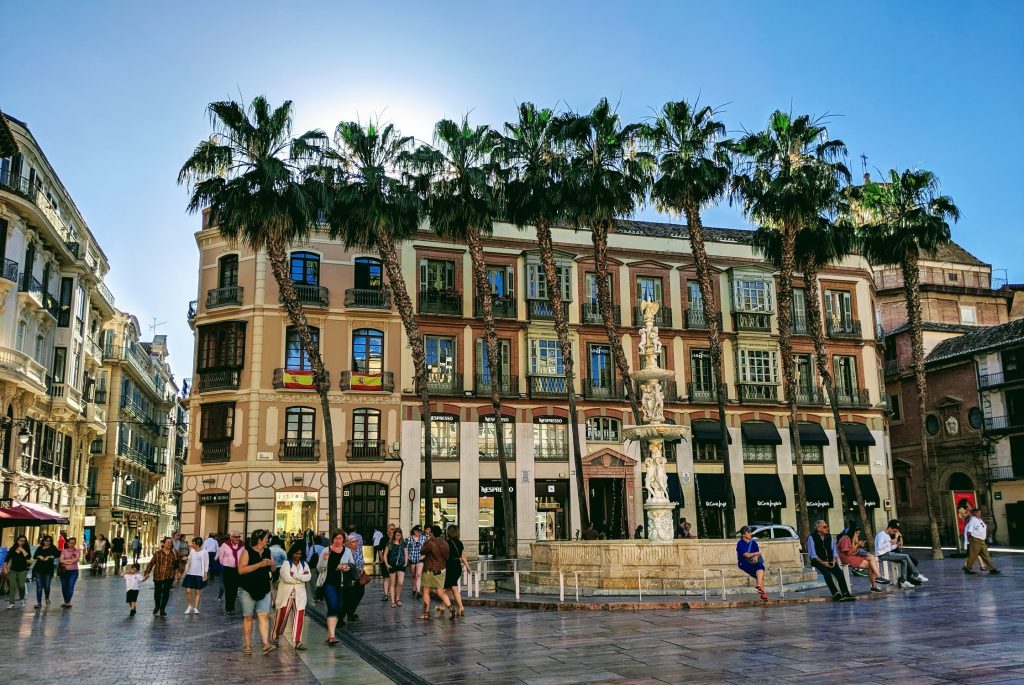
I didn’t do any writing on our recent three-week vacation in Spain. I’d brought some work with me – notes on the novel I’m trying to finish, and ideas for a final story to add to a collection I’d previously considered ready to submit. Never touched any of it.
Too busy sightseeing, eating (paella, bocadillos de jamón, tapas, etc.), drinking wine, practicing Spanish, and napping from all the exertion.
I did manage to type into my phone a daily recap of what we’d seen, done, and eaten before the days blurred into each other and our memories were just a mash-up of museums, cathedrals, castles, and tapas bars with no context or chronology.
Midway through the trip – after we’d spent several days each in the bustle and crowds of Madrid and Barcelona – we spent a night at the Hotel Villa Guadalupe in Málaga. It’s at the top of a narrow, winding street in the El Atabal neighborhood about six miles from the centro histórico. Our daughter Natalie once worked at the hotel restaurant for several months after her year of study in Granada in 2006 where, like some bruja or language savant, she became fluent in Spanish in a matter of months. The restaurant is a favorite with locals for birthday, communion, and baptism celebrations. It’s also popular with tourists, so Natalie’s bilingualism was essential, and the Brits often complimented her on how well she spoke English. It was Natalie who suggested we stay at the hotel for the view and the food, which proved to be breathtaking and spectacular, respectively.
Oh, and there’s a pool. I posted a photo on Facebook of me in it, captioned with a lament of having days earlier received a rejection for a writing residency I’d applied for several months ago. My life at that moment was pretty fabulous, so I could drown my sorrow over rejection right there under the bright blue Málaga skies in that brighter blue water rippled by the Mediterranean breeze. Comments on that post favored the pool over the lost residency, which invited the question: what if the pool and its hotel were a residency?
I started to imagine what it would be like to live and write there in that white-walled hotel at the top of the hill with the magnificent view of the city and sea below. That view. It could lull you with its beauty into a stupor. Hard to write when stupefied. So, maybe a writing residency at one of the other stays my husband diligently researched and booked for us would be more conducive.
In Madrid, our Airbnb apartment was in an 18th century building. The apartment was quite spacious and had an old world, worn elegance – heavy wooden dining table, cherubim hanging on the walls like escapees from a church or art museum, a balcony that looked out on an old, narrow, stone street.
The building was situated in writerly environs, not far from a street named for Cervantes, a plaque honoring philosopher Jose Ortega y Gassett, and the home of playwright/poet/novelist Lope de Vega. If I wrote in this 18th century building, would 18th century ghosts sit at the table with me? Maybe spirits of the Enlightenment. Or specters from the downfall of the Spanish Empire, precipitated by the War of Spanish Succession that resulted in Spain ceding Gibraltar to Britain.
Speaking of Gibraltar, we stayed overnight at The Rock Hotel in a room with a balcony that faced the harbour (spelled with a u because it’s a British harbor, though, of course, if the Spanish owned it, it would be puerto.) I could possibly see myself sitting at the desk in that room, the balcony doors open to the sounds of seagulls, ship and boat horns, the vroom of motor scooters, maybe a stray macaque wandering down from the rock. There would be the problem of the sun in my eyes for half the day. So a good pair of sunglasses would be a must.
In Barcelona, we were in a small, but cozy two-bedroom apartment in Poble Sec, one of the oldest neighborhoods in the city. Our Airbnb host was a New Zealander. The people above us were Russian. The neighborhood was home to many Moroccans and other Africans. It was an interesting, vibrant place to be. The balcony offered a view of a mixed residential and business street. Across from us a community center was lively until 11 each night, except weekends when conversations lasted until 5 am. If I wrote here, maybe those voices would fill my writing the way they filled my sleep.
In Granada, we were in a fifth-floor apartment on one of the narrow, one-way streets that intersect Gran Via. From the dining room, living room, and main bedroom, we had a view of the Catedral de Granada and the Capilla where Fernando and Isabel are buried. The apartment was a short walk to the Albaicín, the old Arab quarter, and the path uphill to the Mirador de San Nicolas, where we went every day to take in the view of the Alhambra and listen to musicians play guitar, sing, and clap the rhythm. There was always a late afternoon and evening breeze. And even though we were surrounded by tourists taking selfies, there was still something magical about that particular spot. Later, we would sit at the dining room table, me facing the window where the cathedral would begin to glow in the evening sky and I would type on my little portable keyboard the events of the day. What would insinuate itself if I wrote there daily, facing that cathedral – me, a non-believer? 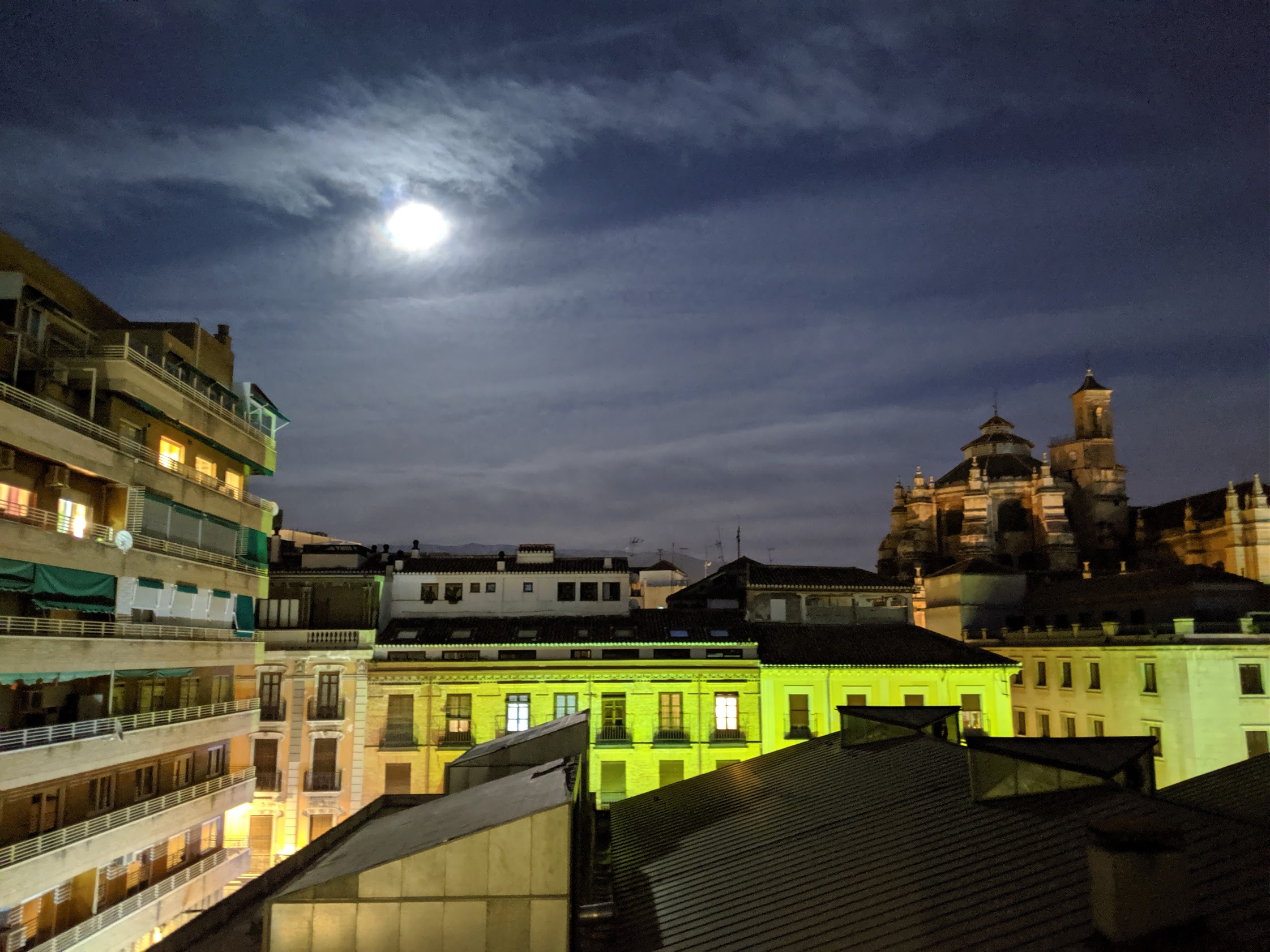
By far, our favorite place to stay was the Airbnb apartment above the Plaza de las Flores in Málaga’s centro histórico. It was a spacious three-bedroom, with two of the bedrooms looking down on the plaza occupied by several small restaurants and a constant flow of people. Every evening, music – Flamenco guitar or classical piano – would drift up to our windows. At 11 pm, I would watch the workers put away tables and chairs and roll up the awnings. It was a noisy enterprise that went on past midnight. The restaurant lights would go out, but the deserted plaza stayed lit and bathed in yellow like a dreamscape. 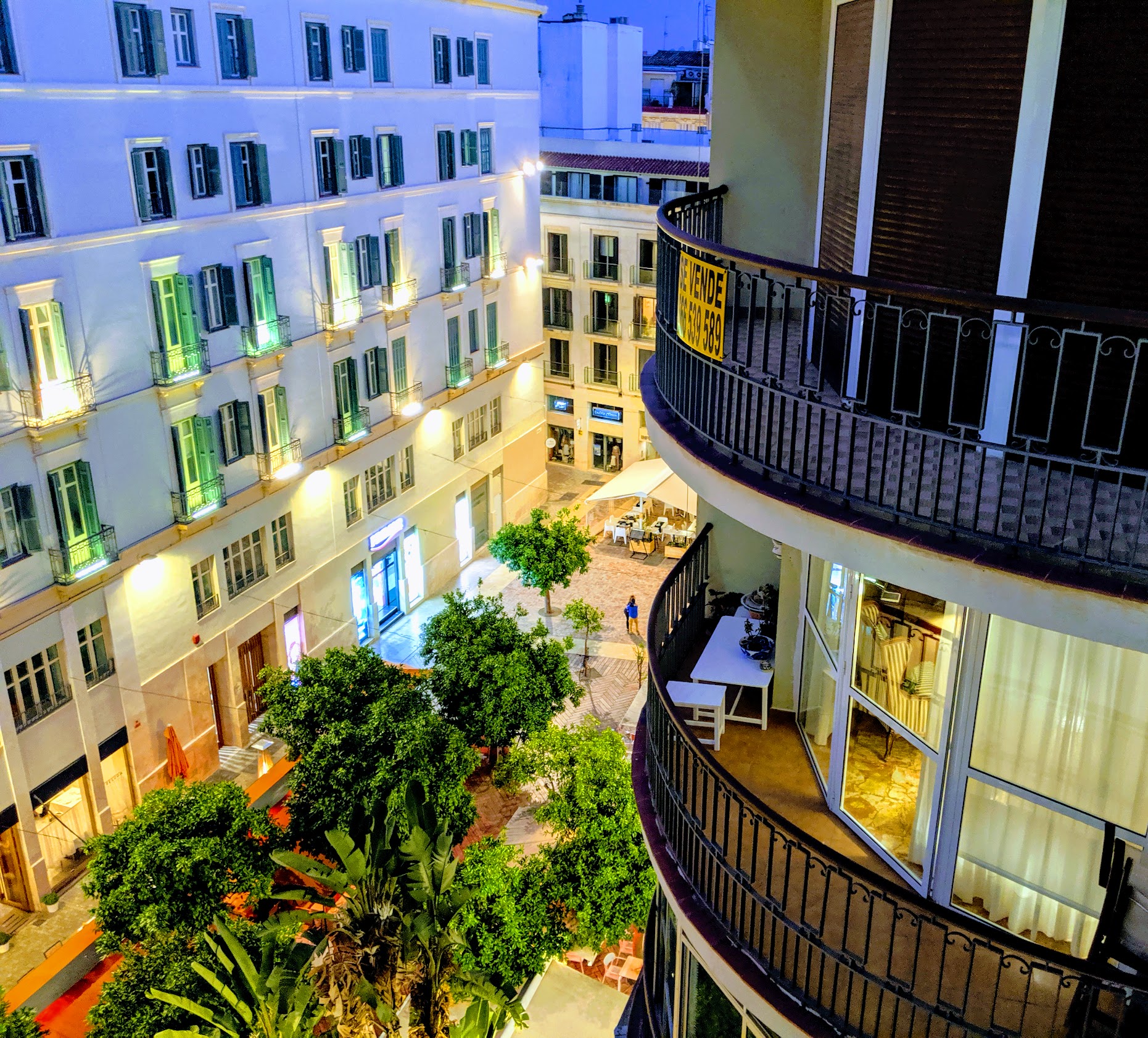
Malaga itself was a dream, easy to fall in love with – smaller city and smaller crowds than Madrid and Barcelona, a perfect climate, and the trademark Andalucía mix of Moorish, Jewish, and Christian history blended in its architecture. Plus, the jacarandas were in full flower while we were there, painting the city with swaths of indigo. The apartment, on the other hand, had a monochrome décor – white walls, gray bedspreads and drapes, black and white art on the walls. It was as if it was daring me to be imaginative and write my own best work. Yes, this is the place I could write. 